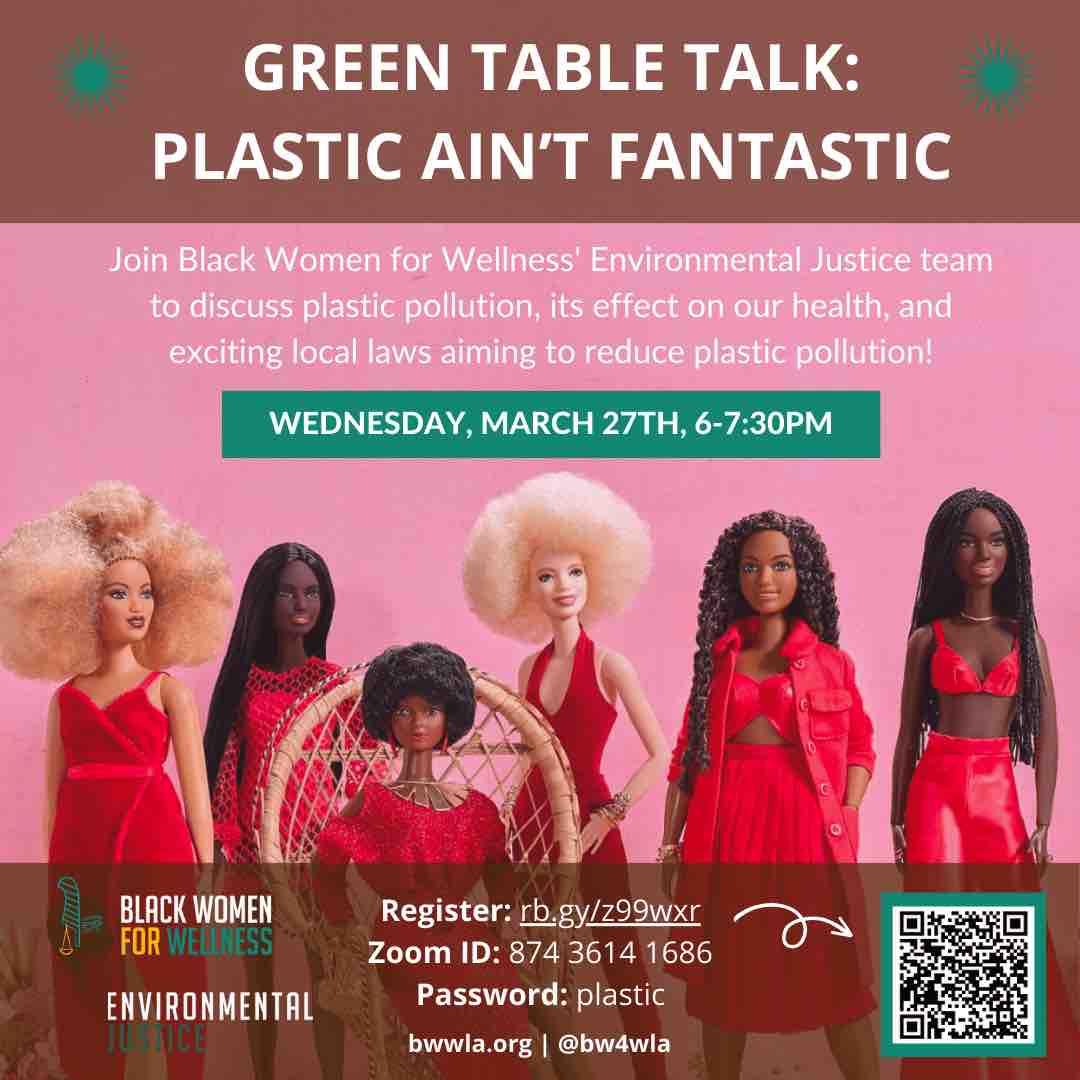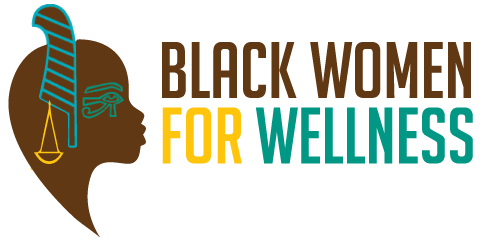
- This event has passed.
Green Table Talk: Plastic Ain’t Fantastic
March 27 @ 6:00 PM - 7:30 PM PDT

Date & Time: March 27, 2024 6 – 7:30PM
Location: Zoom / ID: 874 3614 1686 /PW: plastic
Join Black Women for Wellness’ Environmental Justice team on March 27 at 6pm for a webinar to discuss all things plastics – the good, the bad, and the ugly.
The ‘good’ legislation coming soon, the ‘bad’ health effects of the life cycle of plastic pollution, and the ‘ugly’ truth that BIPOC people around the world bear the highest burden. Plastic is most certainly not fantastic!
Register Here
If you like this event and want to see more, support Black Women for Wellness by volunteering, making a donation or becoming a member!
The ‘Bad” health effects of the life cycle of plastic pollution
The life cycle of plastic pollution involves a series of stages, each contributing to negative health effects on humans and ecosystems.
Here’s a breakdown of the key stages and their associated ‘bad’ health impacts:
- Production: The production of plastics involves extracting and refining oil and gas, followed by polymerization processes. These stages release toxic pollutants, including volatile organic compounds (VOCs), particulate matter, and other greenhouse gases, contributing to respiratory issues, cancer risks, and environmental degradation. Workers in plastic manufacturing facilities are particularly at risk of occupational exposures to these toxic substances.
- Use: During use, plastic products can release harmful chemicals, including bisphenol A (BPA), phthalates, and other additives, into food, water, and the environment. BPA and phthalates are endocrine disruptors, which can interfere with the body’s hormone systems, affecting reproductive health, fetal development, and increasing the risk of obesity, diabetes, and certain cancers.
- Disposal and Decomposition: The majority of plastic waste is either incinerated, sent to landfills, or ends up in the natural environment. Incineration releases toxic pollutants, including dioxins and furans, which can lead to cancer, respiratory diseases, and immune system disorders. Landfilling can lead to the leaching of plastic additives into soil and groundwater, affecting drinking water quality and agricultural products. In natural environments, plastics break down into microplastics, which are ingested by wildlife and enter the food chain, ultimately posing health risks to humans through consumption of contaminated seafood and water.
- Environmental Pollution: Plastic pollution contributes to habitat destruction, loss of biodiversity, and alteration of ecosystems. These environmental impacts can have indirect health effects on humans by disrupting food systems, increasing the prevalence of vector-borne diseases, and exacerbating climate change impacts.
- Socioeconomic Impacts: Communities near plastic production facilities, waste dumps, or heavily polluted areas often suffer from increased health problems, economic losses due to degraded natural resources, and decreased quality of life. These impacts disproportionately affect marginalized and low-income populations, highlighting environmental justice concerns.
The impact of plastic pollution on BIPOC
BIPOC (Black, Indigenous, People of Color) communities around the world often face the heaviest impacts of plastic pollution due to a combination of environmental, economic, and social factors.
Let’s break down why this happens in a way that’s easy to understand:
- Location, Location, Location: Many BIPOC communities are located near areas where plastic is produced, thrown away, or piled up in landfills. These places can release harmful chemicals into the air, water, and soil. It means the air might be dirtier, the water might not be as clean, and the ground could be contaminated, directly affecting the health and well-being of the people who live there.
- Economic Factors: Often, BIPOC communities might not have as much money or resources to deal with the pollution. This can mean less access to healthcare to treat illnesses caused by pollution or fewer opportunities to move to less polluted areas. It also means these communities might not have as strong of a voice to protest against big companies that produce a lot of plastic waste.
- Health Impacts: Because of their closer proximity to pollution and limited access to healthcare, BIPOC individuals often experience higher rates of health issues related to plastic pollution. This includes respiratory problems, birth defects, and other serious health conditions. These health challenges can further strain their economic and social stability, creating a vicious cycle.
- Access to Resources: In many parts of the world, BIPOC communities might not have easy access to clean water or proper waste management services. This can lead to increased exposure to plastic pollution and its negative health effects. When waste isn’t properly managed, it can end up in rivers, oceans, and streets, affecting the community’s health and environment.
- Cultural and Spiritual Impact: For Indigenous and local communities, the environmental degradation caused by plastic pollution can also have profound cultural and spiritual impacts. Natural spaces, plants, and animals that are central to their traditions and ways of life are threatened by pollution, leading to a loss of cultural identity and heritage.
- Global Inequality: The issue of plastic pollution highlights broader global inequalities. Wealthier countries often export their plastic waste to less wealthy countries, many of which have large BIPOC populations. This not only shifts the burden of managing this waste to these countries but also exacerbates the health and environmental challenges they face.
Resources:
Sierra Club’s Discussion on Environmental Racism and Plastic Pollution
Plastic Pollution Coalition’s Take on New Government Initiatives
UNEP’s Report on Plastic Pollution as an Environmental Injustice

